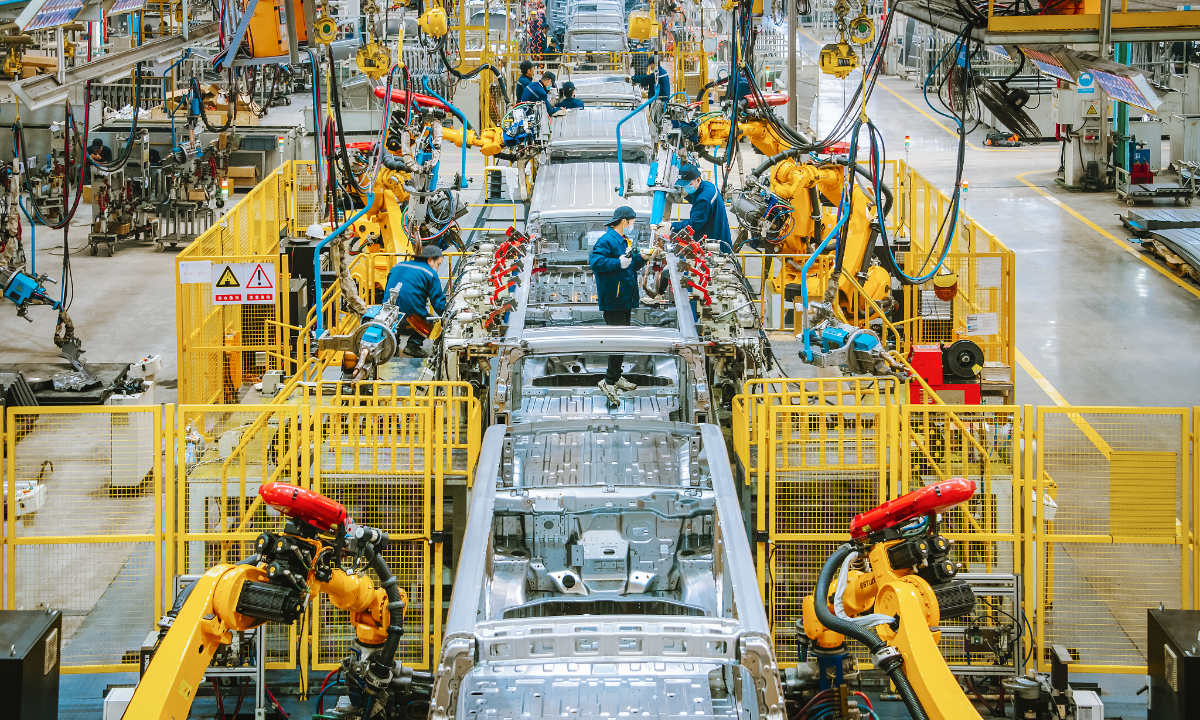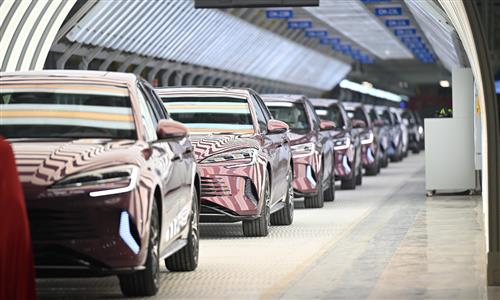BYD debuts new-energy pickup truck in Mexico as Chinese EVs continue to expand in North America amid US tariff increases

NEV Photo:VCG
Despite the "overcapacity" rhetoric of the US and its hiking of tariffs, Chinese electric vehicle (EV) companies continue to make strides in the North American market, with BYD launching its first new-energy powered pickup truck in Mexico on Tuesday.
The latest development shows that Chinese EV makers are continuing to lead the way in innovation and exporting high-quality production capacity to the world, while US protectionism is hindering progress and innovation in the industry, experts said.
BYD SHARK is a super hybrid truck model that achieves 40 percent fuel savings compared with similar fuel trucks. It is also equipped with intelligent features such as a rotating central control screen, voice control and remote vehicle management. The vehicle is set to be launched in more overseas markets to meet the needs of global customers, the Global Times learned from BYD.
According to the Mexican National Institute of Statistics and Geography and the Mexican Association of Automotive Distributors, Chinese car brands such as BYD, JAC Motors and Geely sold 129,329 vehicles in Mexico in 2023, up 63 percent from the previous year. Their market share in Mexico has also grown rapidly to 19.5 percent, up from 6.4 percent in 2019.
In light of this success, more Chinese car companies are looking to invest in manufacturing plants in Mexico.
Major Chinese EV manufacturers including MG, BYD and Chery had been speaking to officials in Mexico to find sites, the Financial Times reported late last year, citing sources.
Sources added that BYD could initially invest hundreds of millions of dollars in the country, while SAIC-owned MG Motor could look to invest up to $2 billion.
Experts believe that the expansion of Chinese companies into Mexico will result in win-win cooperation, gaining a wider market for Chinese companies and bringing benefits to the local automotive industry.
Chinese EV companies' expansion into Mexico is expected to drive the local automotive industry and promote green development by bringing in advanced technology and management expertise from China, Zhang Xiang, director of the Digital Automotive International Cooperation Research Center of the World Digital Economy Forum, told the Global Times on Wednesday.
Victor Cadena, executive vice president of the Mexican Chamber of Commerce in China, told the Global Times that Chinese green-energy companies have already established a strong presence in Mexico.
In addition to supporting the country's green transformation, China's new-energy vehicle (NEV) companies are creating jobs and promoting industrial upgrading.
With Chinese companies announcing plans to build manufacturing plants in Mexico, such as BYD, the prices of NEVs manufactured or assembled in Mexico are expected to be even more competitive than the imported ones, Cadena said.
As Mexico emerges as a popular destination for Chinese EV manufacturers, it has also raised concern from the US, according to media reports.
The Chinese Ministry of Commerce (MOFCOM) emphasized in December that cooperation between China and Mexico in the NEV sector is a normal commercial activity between two sovereign nations, and any intervention by a third party is unwarranted. It urged relevant countries to stop engaging in economic coercion.
The MOFCOM on Tuesday also urged the US to immediately cancel additional tariffs on Chinese green technology products, and it vowed to take resolute measures to defend its rights, after Washington's announcement of plans to increase tariffs on Chinese products, including EVs.
The MOFCOM also stated that the hype surrounding "overcapacity" in China goes against common sense and facts, demonstrating double standards and serving as a form of trade protectionism.
The rise of China's new-energy industries is built on open competition rather than subsidies. It represents advanced production capacities and makes a huge contribution to global inflation reduction and the promotion of green transformation, it added.
Chinese EV brands have been responding to US suppression by continuously innovating and gaining momentum.
On Wednesday, Xiaomi successfully delivered 10,000 units of its first EV model, the SU7, marking a significant step toward achieving its goal of delivering 100,000 units this year.


